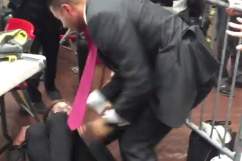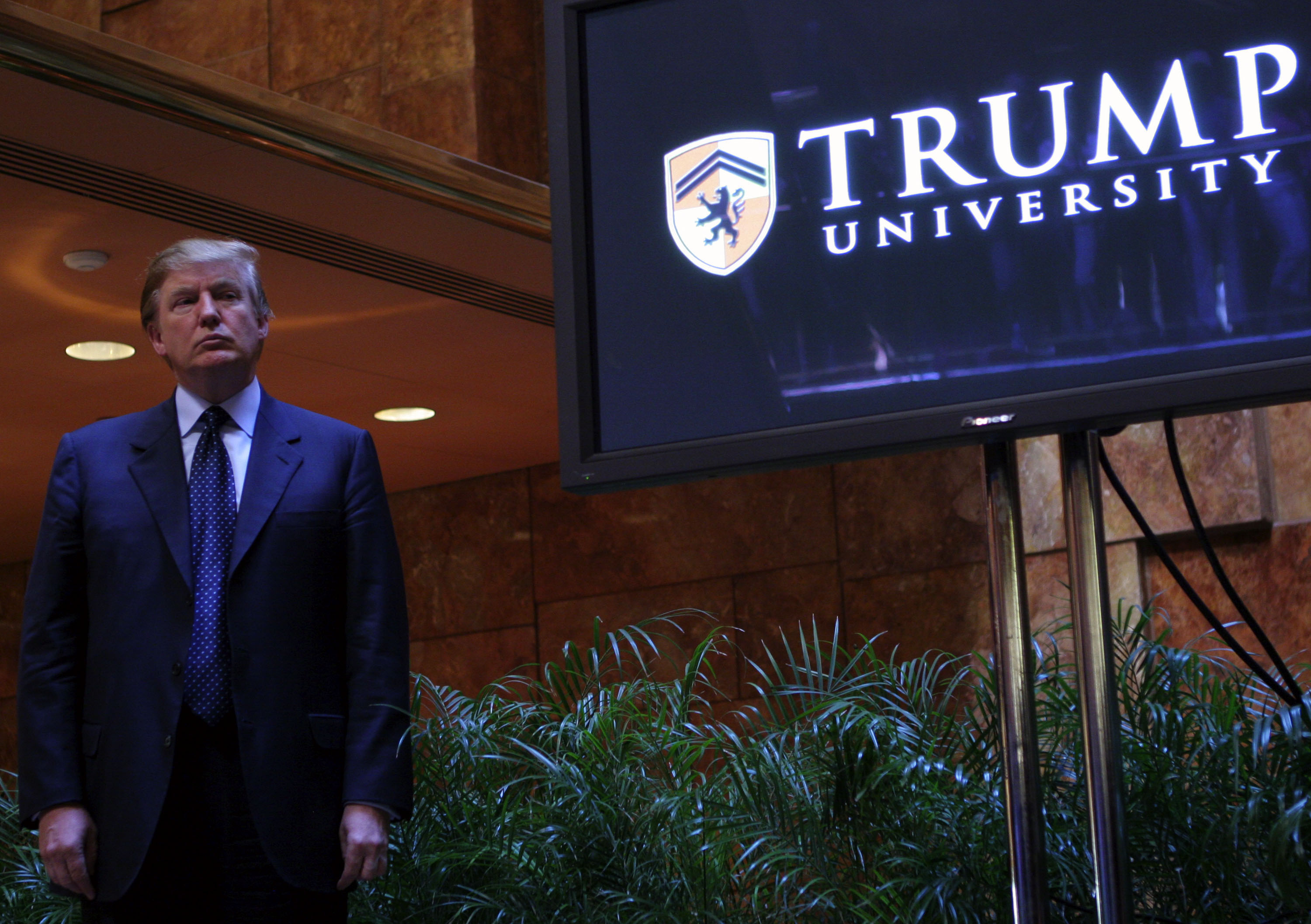
Donald Trump announces the establishment of Trump University on May 23, 2005 in New York City. (Getty)
Republican presidential frontrunner Donald Trump has been put on the defensive about Trump University, a controversial real estate training program that is the target of multiple lawsuits, after he was attacked about it by both Marco Rubio and Ted Cruz.
Trump has called the now-defunct program a successful one and has downplayed the legal issues, but it is likely to continue to be a problem for his campaign.
The program was renamed The Trump Entrepreneur Initiative in 2010 after state officials in New York ruled “university” was misleading because it was not an accredited higher education institution.
Here’s what you need to know:
1. Trump University Was Founded in 2005 & 9,000 Paid for Real Estate Seminars Before it Folded in 2010
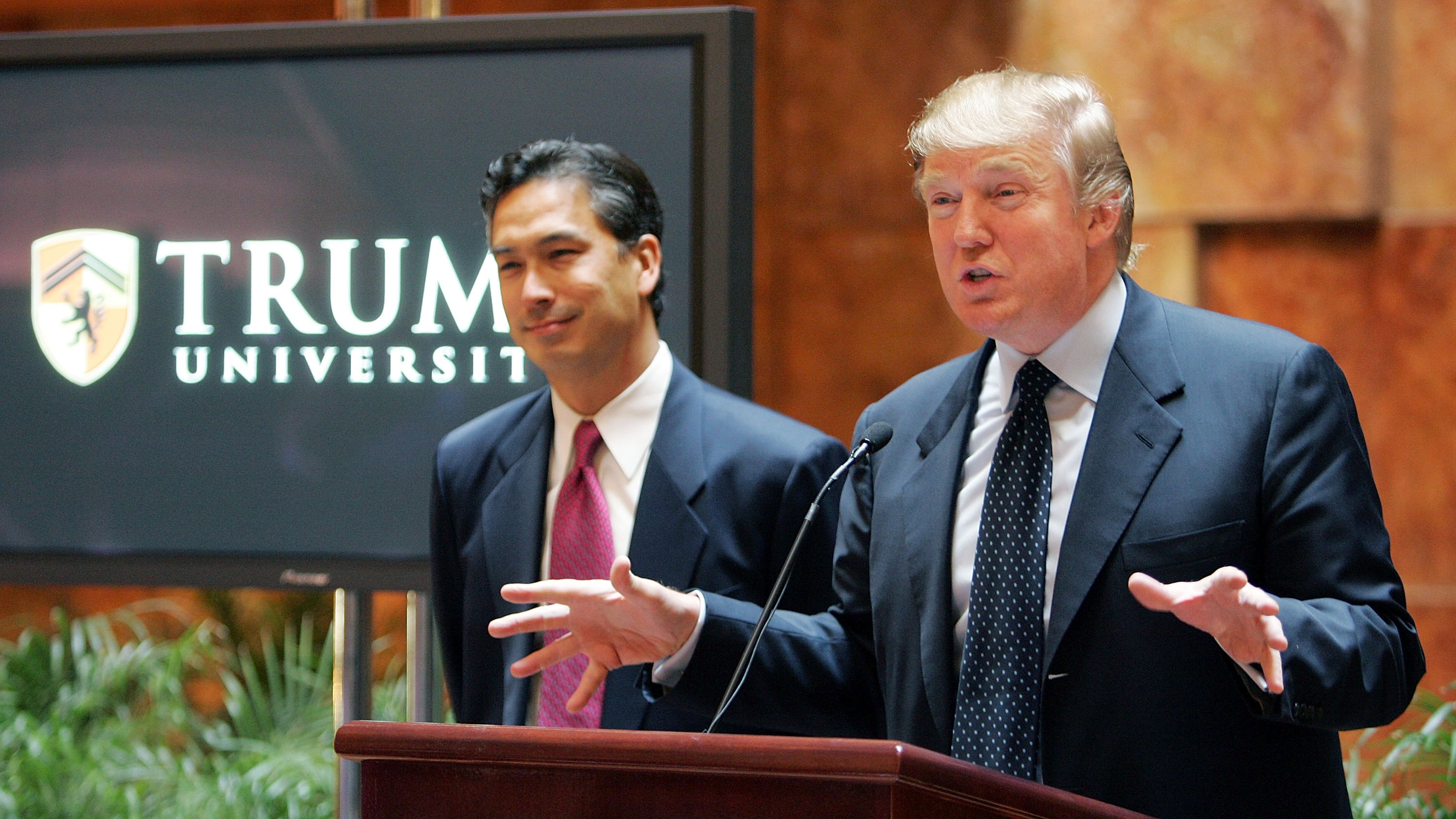
Donald Trump unveils Trump University in 2005. (Getty)
Donald Trump launched Trump University in 2005 along with Michael Sexton, the program’s co-founder and president, at a news conference. Bloomber Business described the program as a foray into the “fast growing field of online education” in an article after the announcement:
Trump U. won’t be offering degrees, or even classes in the traditional sense. Instead, the plan is to provide short, focused lessons in specific subjects that emphasize practice over theory. The first three courses available to students, at the price of $300 apiece, are introductions to real estate, marketing, and entrepreneurship.
Trump University won’t have any textbooks, either. No lectures, no grades — not even teachers, most of the time. Students will be divided up into cohorts of 6 to 12 and can choose to complete the courses in either one or two weeks.
They’ll log on at trumpuniversity.com to get their assignments – entrepreneurship students will be asked to assume the role of a venture capitalist and analyze a business plan – and submit their work to classmates for a peer review. Three such assignments, and the course is complete. ‘People have learned the hard way that…trying to replicate the classroom experience isn’t particularly effective,’ says Sexton, a venture capitalist by trade.
According to the Washington Post, more than 80,000 people attended the free introductory seminars that were held in hotel ballrooms around the United States. About 9,200 signed up for the three-day online seminars, for $1,495, and nearly 800 paid for the $35,000 package that included one-on-one mentoring, the Post reported.
The name was changed in 2010 to the Trump Entrepreneur Initiative at the request of the New York State Education Department and then stopped operating soon after, the newspaper reported.
2. Students in San Diego & New York Sued Trump Claiming They Paid Thousands for Nothing
Trump University is the target of ongoing lawsuits in both New York state court and California federal court.
Schneiderman called Trump University a “bait and switch scheme” after pursuing legal action against it in 2013.
According to the New York Times, the suit seeks $40 million in restitution for 600 New Yorkers who Schneiderman claims were defrauded by Trump University. The attorney general said the school made “false promises” and convinced people to “spend tens of thousands of dollars they couldn’t afford for lessons they never got.”
A group of students filed a class-action lawsuit against Trump in federal court in San Diego in 2010. You can read the class-action lawsuit filed in 2010 below or by clicking here if the PDF does not appear:
Another lawsuit was filed in 2013 by Art Cohen, a California businessman. You can read the lawsuit filed by Cohen below or by clicking here:
According to the Los Angeles Times, the lawsuits could be heard in federal court soon.
3. Trump Has Called the Lawsuits a ‘Small Deal’ & Says Most Students Thought the Courses Were ‘Terrific’
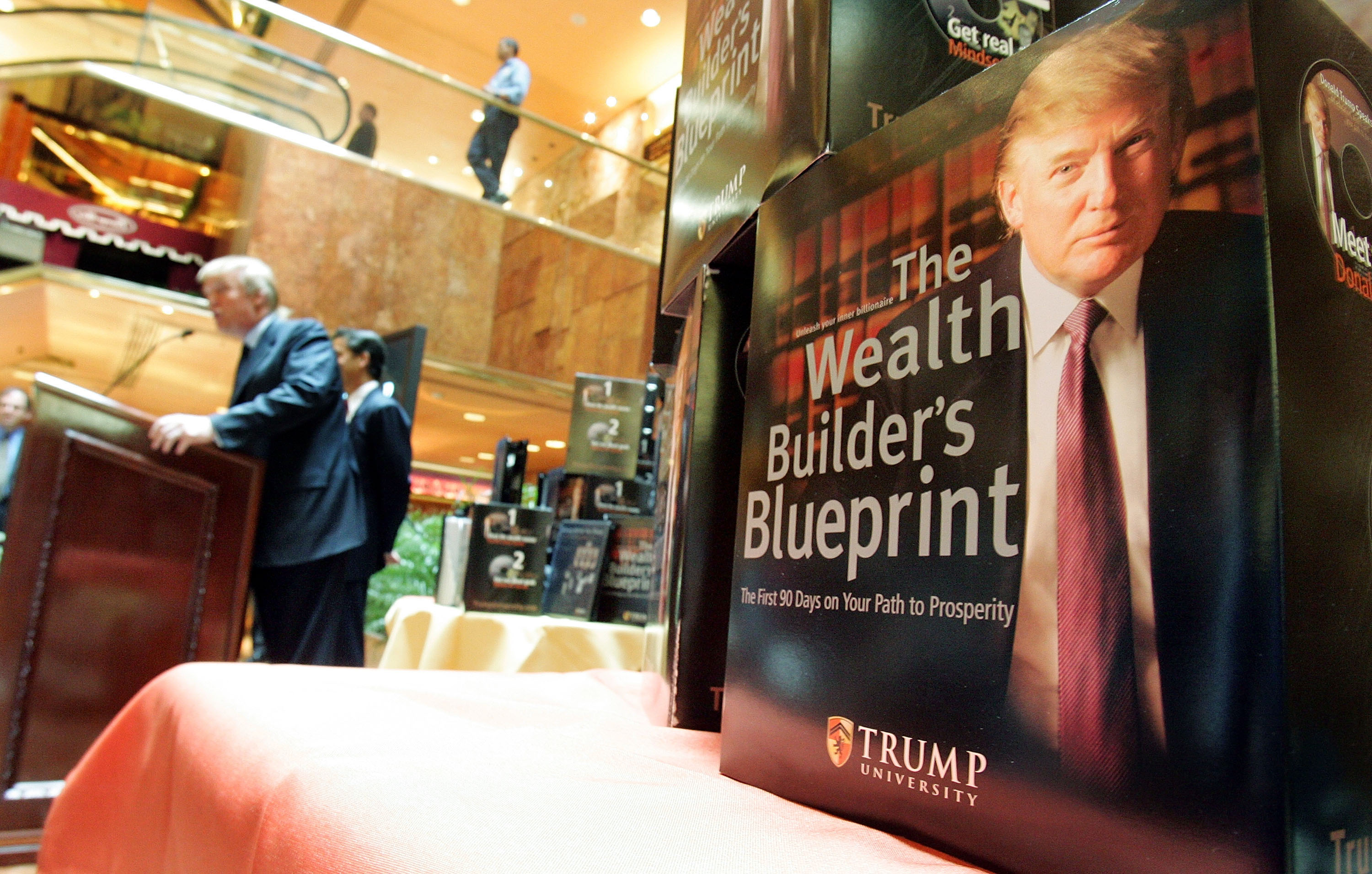
(Getty)
Trump has called the lawsuits a “small deal,” according to CBS News. He also said he could have settled the lawsuits but is fighting them out of principle.
The Republican frontrunner said 98 percent of the students who took the courses “thought they were terrific.”
His attorney, Alan Garten, told CNN, “All we can do is provide the tools for people to go out there and apply these things,” Garten said. “I can’t control what happens out in the real world. If someone goes and takes our classes and decides to sit on their couch and not apply them, I can’t help that, OK?”
4. The Presidential Frontrunner Says the Hispanic Judge Has ‘Tremendous Hostility’ Towards Him
Trump created further controversy Sunday while discussing the lawsuits on NBC’s “Meet the Press.” He said U.S. District Judge Gonzalo Curiel has shown “tremendous hostility for him,” and added, “He’s Hispanic, which is fine.”
Curiel is the judge on the San Diego lawsuits.
When asked by the show’s moderator, Chuck Todd, if Trump planned to ask for the judge to recuse himself because of his ethnicity, Trump replied, “Because I think he’s been very, very unfair with us,” Trump replied. “ I think the judge has been extremely unfair. This is a case that many, many, many people said should have been thrown out on summary judgment. We have 98 percent approval. We have an A from the Better Business Bureau.”
When pushed by Todd, Trump continued, “Well because of the wall, and because of everything that’s going with Mexico and all of that, I think it’s frankly – look, this is a judge who has treated me very, very unfairly. This is a case that should have been thrown out a long time ago in the opinion of many great lawyers.”
Curiel, originally from Chicago, was appointed to the federal judiciary by President Barack Obama in 2011 and was confirmed by the Senate in 2012. He was previously a superior court judge in California and was the Assistant U.S. Attorney for the Central District of California.
5. Rubio & Cruz Used the Lawsuits to Attack Trump During the Last Republican Debate
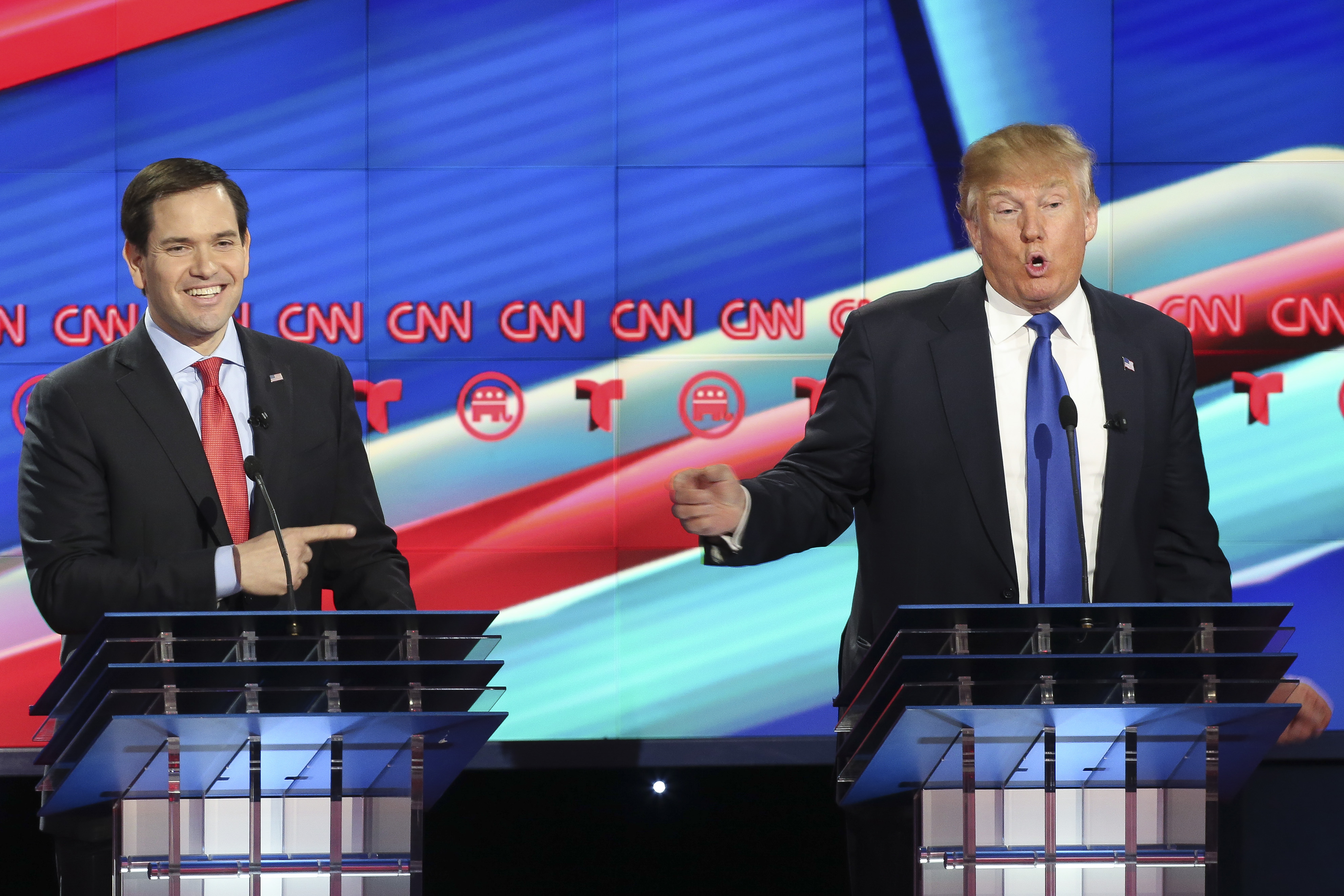
Marco Rubio, left, listens as Donald Trump answers a question during the Republican Presidential Primary Debate at the University of Houston Thursday, Feb. 25, 2016. (Gary Coronado/Houston Chronicle/Getty)
Trump was hammered about the Trump University scandal by two of his opponents, Florida Senator Marco Rubio and Texas Senator Ted Cruz, during the February 25 Republican debate.
“There are people who borrowed $36,000 to go to Trump University, and they’re suing now,” Rubio said. “And you know what they got? They got to take a picture with a cardboard cutout of Donald Trump.”
Cruz piled on, saying the “mainstream media” would be all over the lawsuits if Trump was the nominee.
“You know, Marco made reference earlier to the litigation against Trump University. It’s a fraud case, ” Cruz said.
Trump told the debate audience he plans to fight the lawsuits and they aren’t a problem.
“It’s something I could have settled many times,” Trump said. “I could settle it right now for very little money, but I don’t want to do it out of principle. The people that took the course all signed, most, many, many signed report cards saying it was fantastic, it was wonderful, it was beautiful. And believe me, I’ll win that case.”

